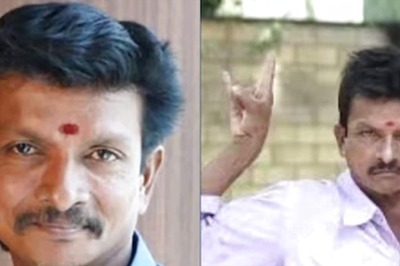
views
The "loans for peerages" scandal broke out last month in Britain when it emerged that some businessmen who had loaned the Labour party vast sums of money were subsequently nominated by Downing Street to the House of Lords. Under British electoral law, donations of over 5000 pounds are declarable to the public. The same applies to all loans on non-commercial terms.
The Electoral Commission is now investigating whether the loans were not on commercial terms and whether they were effectively, de facto donations. Further, the police may also be considering extending an investigation into a breach of electoral provisions into a full blown inquiry into corruption. The above investigations encompass arrangements within other political parties as well. Hence, the unusual cross-party silence at Westminster on the issue.
It never ceases to amaze how quickly the political temper can change. An adversarial political culture switches to a consensual approach and camaraderie with remarkable dexterity when collective political interests are at stake. The sudden willingness to reach an all party settlement on the "office of profit" issue bears this out too. However, it isn't just the exclusive interests of politicians alone that is at stake. Rather, the essential integrity of the democratic process is in issue here.
In India, the office of profit controversy masks a deeper malaise that should attract public scrutiny. The parliament is soaking with industrialists, especially in the Rajya Sabha. On the face of it, there isn't anything that ought to make this an exceptionally unwelcome development. Representatives of the world of industry and commerce provide a knowledgeable additional voice to insular parliamentary proceedings. However, in the interests of transparency, all political parties should certainly provide full and frank disclosure to the general public whether they are the beneficiaries of donations given by any such MP. Democracy and evasiveness do not sit together comfortably.
The world of political financing is tainted with the suspicion of opacity and malpractice. While the political parties are obliged to disclose contributions exceeding 20,000 rupees, there is some doubt that this is followed. The Election Commission laments that the present system is "not sufficient for ensuring transparency and accountability in the financial management of political parties". The Commission recommends that political parties should publish accounts annually and that the accounts should be audited by a firm approved by the Comptroller and Auditor General.
The office of profit saga also reveals woeful defects in the law. The law focuses on the prevention of a conflict of interest relating to an MP holding another office under an establishment of the central or state government. It does not cater to a conflict that might arise due to the private commercial interests of an individual member. This is entirely illogical and adverse to the public interest. At the very least, an MP should be required to declare a direct or indirect personal interest before voting on any legislative measure.
There was a time when the constitutional doctrine of separation of powers was steeped in a discussion related to the necessary separation of the church from the state and the separation of the executive, legislature and judiciary from each other. As things stand, it might just be appropriate to add another theory to the nation's grand constitutional narrative: a separation of big business from politics!
As the principle partner in the UPA government, it is up to the Congress to take the lead in promoting greater transparency in all dealings and to ensure that reforms of the current system are as comprehensive as possible. India's tryst with destiny should not be permitted to be derailed by insalubrious wheeler-dealers, sleazy middlemen and political auctioneering. The road shows in Rae Bareilly are of little value unless matched by decisive moral leadership in Delhi.
Rishabh Bhandari is a lawyer at a global law firm in London. These are his personal views.first published:April 03, 2006, 16:41 ISTlast updated:April 03, 2006, 16:41 IST
window._taboola = window._taboola || [];_taboola.push({mode: 'thumbnails-mid-article',container: 'taboola-mid-article-thumbnails',placement: 'Mid Article Thumbnails',target_type: 'mix'});
let eventFire = false;
window.addEventListener('scroll', () => {
if (window.taboolaInt && !eventFire) {
setTimeout(() => {
ga('send', 'event', 'Mid Article Thumbnails', 'PV');
ga('set', 'dimension22', "Taboola Yes");
}, 4000);
eventFire = true;
}
});
window._taboola = window._taboola || [];_taboola.push({mode: 'thumbnails-a', container: 'taboola-below-article-thumbnails', placement: 'Below Article Thumbnails', target_type: 'mix' });Latest News
This is a tale of two scandals, one in Britain and the other in India. The facts are different but the underlying themes are similar: the uneasy cohabitation of politics and big business are at the heart of both. It confirms the era of supermarket politics. When a seat in parliament is allegedly up for grabs to the highest bidder, when politics can be reduced to a space where vendors meet prospective purchasers, it is time to take a deep look at the prevalent political culture and ask some difficult questions.
The "loans for peerages" scandal broke out last month in Britain when it emerged that some businessmen who had loaned the Labour party vast sums of money were subsequently nominated by Downing Street to the House of Lords. Under British electoral law, donations of over 5000 pounds are declarable to the public. The same applies to all loans on non-commercial terms.
The Electoral Commission is now investigating whether the loans were not on commercial terms and whether they were effectively, de facto donations. Further, the police may also be considering extending an investigation into a breach of electoral provisions into a full blown inquiry into corruption. The above investigations encompass arrangements within other political parties as well. Hence, the unusual cross-party silence at Westminster on the issue.
It never ceases to amaze how quickly the political temper can change. An adversarial political culture switches to a consensual approach and camaraderie with remarkable dexterity when collective political interests are at stake. The sudden willingness to reach an all party settlement on the "office of profit" issue bears this out too. However, it isn't just the exclusive interests of politicians alone that is at stake. Rather, the essential integrity of the democratic process is in issue here.
In India, the office of profit controversy masks a deeper malaise that should attract public scrutiny. The parliament is soaking with industrialists, especially in the Rajya Sabha. On the face of it, there isn't anything that ought to make this an exceptionally unwelcome development. Representatives of the world of industry and commerce provide a knowledgeable additional voice to insular parliamentary proceedings. However, in the interests of transparency, all political parties should certainly provide full and frank disclosure to the general public whether they are the beneficiaries of donations given by any such MP. Democracy and evasiveness do not sit together comfortably.
The world of political financing is tainted with the suspicion of opacity and malpractice. While the political parties are obliged to disclose contributions exceeding 20,000 rupees, there is some doubt that this is followed. The Election Commission laments that the present system is "not sufficient for ensuring transparency and accountability in the financial management of political parties". The Commission recommends that political parties should publish accounts annually and that the accounts should be audited by a firm approved by the Comptroller and Auditor General.
The office of profit saga also reveals woeful defects in the law. The law focuses on the prevention of a conflict of interest relating to an MP holding another office under an establishment of the central or state government. It does not cater to a conflict that might arise due to the private commercial interests of an individual member. This is entirely illogical and adverse to the public interest. At the very least, an MP should be required to declare a direct or indirect personal interest before voting on any legislative measure.
There was a time when the constitutional doctrine of separation of powers was steeped in a discussion related to the necessary separation of the church from the state and the separation of the executive, legislature and judiciary from each other. As things stand, it might just be appropriate to add another theory to the nation's grand constitutional narrative: a separation of big business from politics!
As the principle partner in the UPA government, it is up to the Congress to take the lead in promoting greater transparency in all dealings and to ensure that reforms of the current system are as comprehensive as possible. India's tryst with destiny should not be permitted to be derailed by insalubrious wheeler-dealers, sleazy middlemen and political auctioneering. The road shows in Rae Bareilly are of little value unless matched by decisive moral leadership in Delhi.
Rishabh Bhandari is a lawyer at a global law firm in London. These are his personal views.




















Comments
0 comment